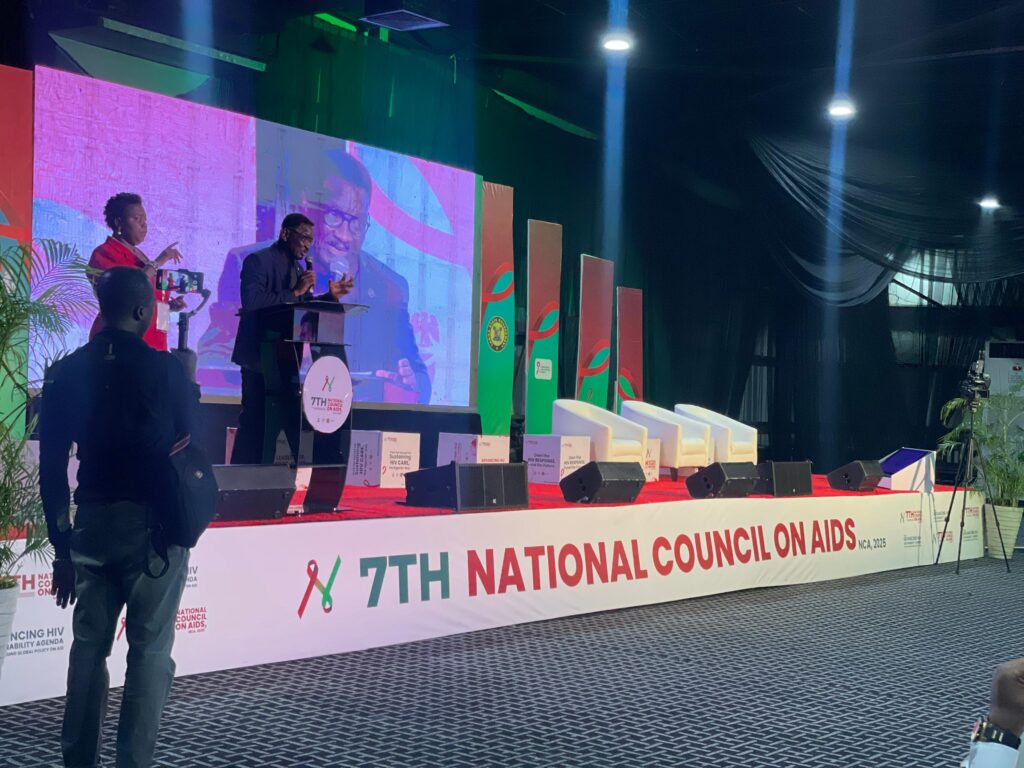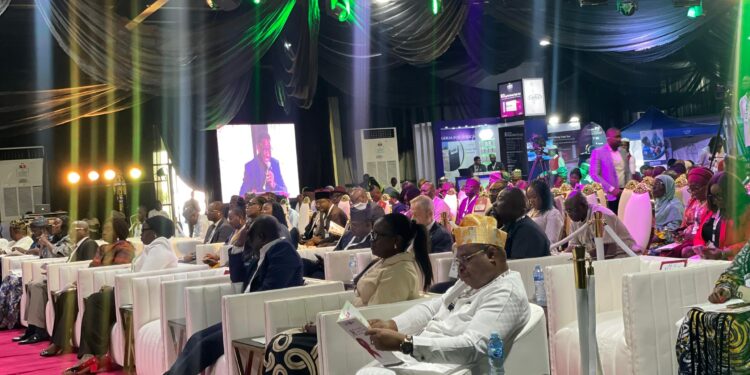The 7th National Council on AIDS (NCA) officially opened on August 5, 2025, at the Landmark Event Centre in Victoria Island, Lagos, marking a pivotal moment in Nigeria’s ongoing fight against HIV/AIDS.
With the theme “Advancing National HIV Sustainability Agenda in the Changing Global Policy on Aid,” this year’s gathering has brought together federal and state-level stakeholders, development partners, healthcare professionals, and civil society members, all united in the mission to ensure the long-term sustainability of Nigeria’s HIV response.
In her opening remarks, Dr. Temitope Ilori, Director General of the National Agency for the Control of AIDS (NACA), expressed his profound gratitude to attendees and set the tone for the conference’s critical discussions.
DG’s Speech at the Opening Ceremony
“It is with immense pleasure and a profound sense of purpose that I, Dr. Temitope Ilori, Director General of the National Agency for the Control of AIDS (NACA), welcome you all to the 7th National Council on AIDS (NCA) meeting.
As you are aware, this year’s NCA is proudly hosted here in the great and vibrant city of Lagos. Your presence today underscores our collective commitment and unwavering dedication to the fight against HIV/AIDS in Nigeria. This gathering is not merely a routine meeting; it is a pivotal moment for reflection, strategic realignment, and renewed action as we navigate the evolving landscape of emerging global health emergencies and developmental realities.
Lagos, a city renowned for its dynamism and resilience, provides a fitting backdrop for this crucial assembly. The Lagos spirit of innovation and progress mirrors our aspirations for a sustainable national HIV response, given the fast-changing realities of dwindling development assistance and aid. We are particularly grateful to the Lagos State Government and the Lagos State Agency for the Control of AIDS (Lagos SACA) for their exceptional hospitality and partnership in making this event a reality.

Their commitment to public health, and specifically to the HIV response, is commendable and serves as an inspiration to us all and reflective of the common parlance… “EKO ‘NI BAJE OOH.”
The National Council on AIDS, as many of you know, is a statutory body established by the NACA Establishment Act of 2006. It serves as the highest policy-making and coordinating platform for the national HIV/AIDS response in Nigeria. This annual meeting is a testament to our commitment to structured governance, accountability, and multi-sectoral collaboration at all levels.
It is here, within these hallowed discussions, that we integrate lessons learned, assess progress, and forge resolutions that intensify our approaches to the national response. Our ultimate goal remains clear: to address existing gaps in HIV policies and program implementation, ensuring that no one is left behind in our journey towards an AIDS-free Nigeria driven by ownership and sustainability.
The functions of the NCA are broad and critical. We are tasked with coordinating all intervention programs for the prevention, control, and management of HIV and AIDS across the Federation. We are also responsible for establishing minimum standards for the control and management of HIV and AIDS by providing strategic and technical direction. Essentially, the NCA is a forum where we maintain unity and cooperation among all stakeholders involved in the fight against HIV and AIDS by fostering a collaborative environment that is essential for sustainable impact.
This year, the 7th National Council on AIDS is convened under the profoundly relevant theme: “Advancing National HIV Sustainability Agenda in the Changing Global Policy on Aid.” This theme is not merely a set of words; it is a strategic imperative that reflects the critical juncture at which our national HIV response now stands. The global landscape of aid and development assistance has shifted and rapidly changed, presenting both challenges and opportunities that demand our collective wisdom, honest collaboration, and proactive engagement. We must adapt, innovate, and strengthen our domestic capacities to ensure the long-term sustainability of not only HIV, but of TB and Malaria programmes.
The theme is meticulously structured around three key tracks, each designed to guide our discussions and resolutions over the next few days during the technical sessions:
Track 1: Advancing the National HIV Sustainability Agenda in a Changing Global Aid Landscape. This track compels us to critically examine our current strategies for financial and programmatic sustainability. With evolving global funding priorities and the imperative to foster greater self-reliance at all levels, we must identify and implement innovative financing mechanisms, strengthen domestic resource mobilisation, and optimise the efficiency of our existing programs. It is about building resilient responses for HIV, TB, and Malaria that can withstand external shifts and continue to deliver life-saving services to those who need them the most.
Track 2: Multi-Sectoral Approaches for the Sustainability of HIV and Related Development Diseases. The fight against HIV/AIDS cannot be waged in isolation. It is intrinsically linked to broader development challenges and other public health concerns, including Tuberculosis and Malaria. This track emphasises the importance of integrated approaches, fostering synergies across various sectors – health, education, social welfare, and economic development – to achieve sustainable outcomes. By addressing the social determinants of health and strengthening the health systems holistically, we can create a more robust and equitable response that benefits all Nigerians.
Track 3: Strengthening Sub-National Structures for Sustainability and Effective Health Systems. The success of our national response ultimately hinges on the strength and effectiveness of our sub-national mandated structures. This track focuses on empowering sub-national mandated structures/entities, enhancing their capacities for coordination, implementation, and data-driven decision-making. By decentralising and strengthening health systems at the grassroots level, we can ensure that interventions are tailored to local contexts and reach the most vulnerable populations amongst us.
The importance of this year’s Council is further amplified by the following critical factors:
Firstly, the changing global policy on aid necessitates a proactive and strategic response from Nigeria. We must accelerate the implementation of our HIV, TB, and Malaria Sustainability Plan and ensure that our progress is not derailed by shifts in international support.
As part of the government’s initial demonstration of commitment, the Bola Ahmed Tinubu-led Federal Government has released $200 million to address the immediate to short-term gaps, especially to forestall a possible commodity gap that may arise from the suspension of PEPFAR support. This bold step underscores Nigeria’s determination to take ownership of its HIV response and secure the health and well-being of its citizens.
Secondly, with the support of UNAIDS and through the Global Fund, Nigeria is currently piloting the operationalisation of the National HIV, TB, and Malaria Sustainability Plan in seven states of Akwa Ibom, Ebonyi, Anambra, Gombe, Kwara, Kaduna, and Lagos, with the plan for scale-up to the remaining states of the Federation. This initiative aims to evolve innovative solutions and localised approaches.
The SACAs are statutorily responsible for coordinating these engagements, and this NCA provides a vital platform for Council Members and all relevant stakeholders – including leadership of TB and Malaria programs – to collaborate, discuss emerging realities, and provide an integrated technical direction for the sustainability of our national responses to HIV and other developmental diseases of concern.
Thirdly, this meeting offers a crucial opportunity to review the implementation status of the twelve resolutions approved during the 6th NCA. Accountability and continuous improvement are hallmarks of our approach, and we are eager to assess our progress and identify areas for further action.
Furthermore, stakeholders will also deliberate on new memos submitted for the 7th Council.
These memoranda will be meticulously reviewed to inform new directions and strategies to ensure that our policies remain responsive and relevant to the evolving challenges on the ground.
To achieve these ambitious objectives, we have meticulously planned a comprehensive methodology that will foster intensive engagement and productive outcomes. We have also ensured the provision of an online participation platform to facilitate virtual engagement, recognising the importance of inclusivity and broader participation.
As we embark on the deliberations of the 7th National Council on AIDS, I urge each one of you to engage actively, share your expertise, and contribute to the robust discussions that will shape the future of our HIV response. The challenges before us are significant, but more significant is our collective resolve and capacity for innovation. We must continue to push the boundaries, embrace new technologies, and strengthen our partnerships to achieve our shared vision of an AIDS-free Nigeria.
Our journey towards sustainability is a continuous one, requiring unwavering commitment and adaptive strategies.
As I close, I want to extend my deepest gratitude to the Lagos State Government and our mother of the day, Her Excellency, Dr. (Mrs.) Ibijoke Sanwo-Olu, Council Members, and partners for your invaluable contributions and unwavering support. Your collaboration is the bedrock of our success, and we look forward to strengthening these partnerships as we move forward.
To the dedicated staff of NACA, LSACA, and all the sub-committees who have worked tirelessly behind the scenes to organise this momentous event, I commend your diligence and commitment. Your efforts have ensured that we have a conducive environment for productive deliberations.
Again, to the Government and people of Lagos State, I say thank you for your warm reception and for hosting this critical gathering. Your leadership in the health sector is truly inspiring.
I wish you all fruitful deliberations and a successful 7th National Council on AIDS.
Thank you, and God bless Lagos State and the Federal Republic of Nigeria.









